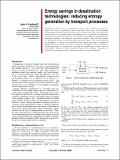Energy Savings in Desalination Technologies: Reducing Entropy Generation by Transport Processes
Author(s)
Lienhard, John H
DownloadPublished version (835.9Kb)
Terms of use
Metadata
Show full item recordAbstract
© 2019 by ASME. Desalination systems can be conceptualized as power cycles in which the useful work output is the work of separation of fresh water from saline water. In this framing, thermodynamic analysis provides powerful tools for raising energy efficiency. This paper discusses the use of entropy generation minimization for a spectrum of desalination technologies, including those based on reverse osmosis (RO), humidification-dehumidification (HDH), membrane distillation (MD), electrodialysis (ED), and forward osmosis (FO). Heat and mass transfer are the primary causes of entropy production in these systems. The energy efficiency of desalination is shown to be maximized when entropy generation is minimized. Equipartitioning of entropy generation is considered and applied. The mechanisms of entropy generation are characterized, including the identification of major causes of irreversibility. Methods to limit discarded exergy are also identified. Prospects and technology development needs for further improvement are mentioned briefly.
Date issued
2019-05Department
Massachusetts Institute of Technology. Department of Mechanical Engineering; Rohsenow Kendall Heat Transfer Laboratory (Massachusetts Institute of Technology)Journal
Journal of Heat Transfer
Publisher
ASME International
Citation
Lienhard, John H., V. "Energy Savings in Desalination Technologies: Reducing Entropy Generation by Transport Processes." Journal of Heat Transfer 141, 7 (May 2019): 072001 © 2019 ASME
Version: Final published version
ISSN
0022-1481